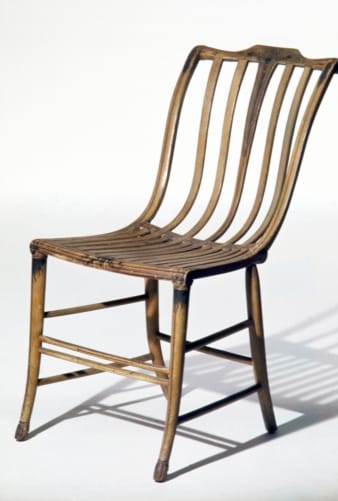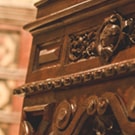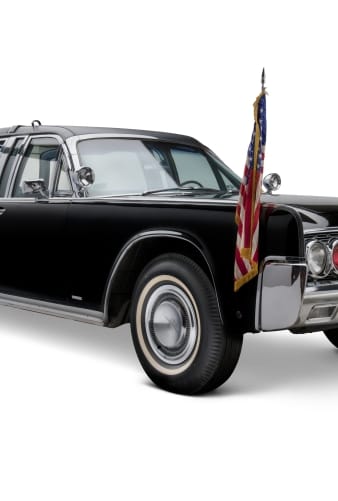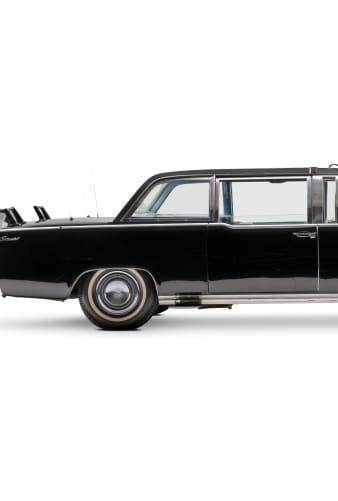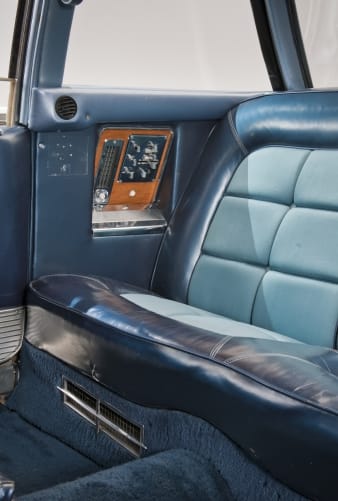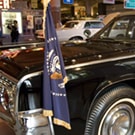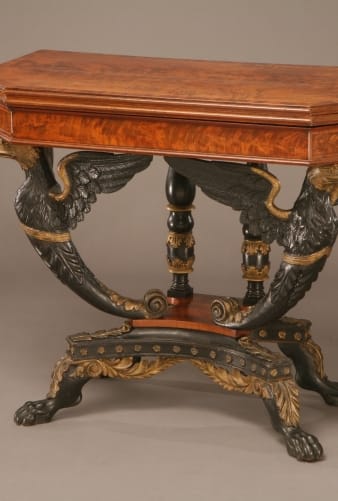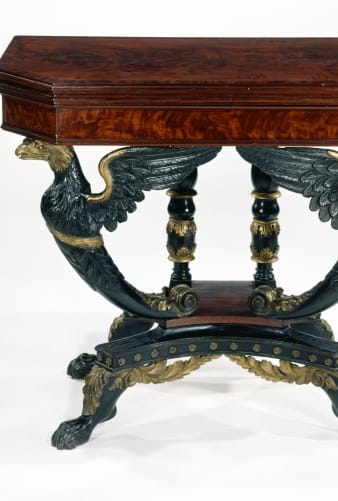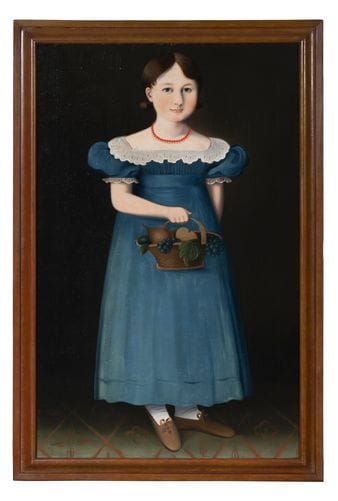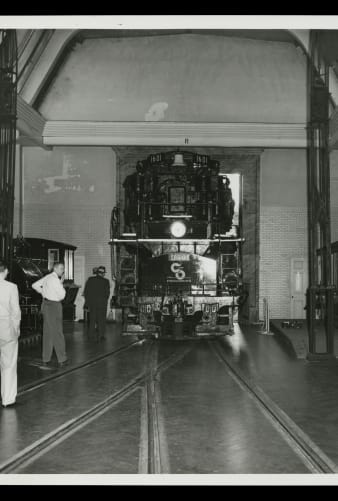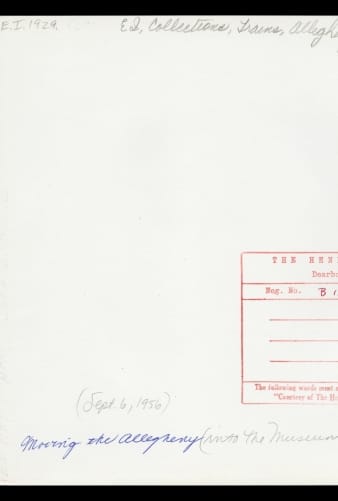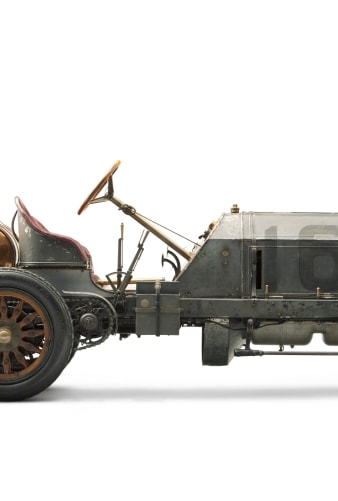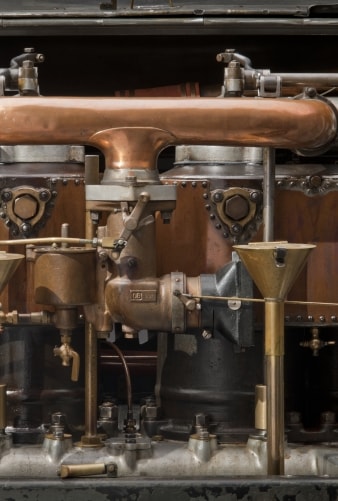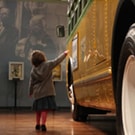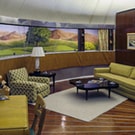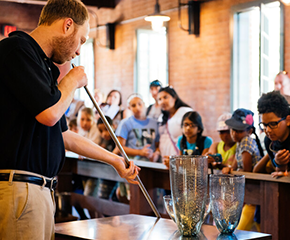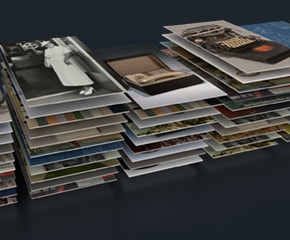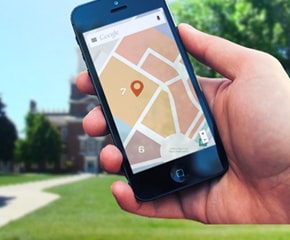
Evolution of
Our Collection
Adding to the Collections
Henry Ford had collected a slice of the American past unmatched in size and scope. After Ford’s passing in 1947, Museum staff both honored and expanded upon his collecting legacy. Many items continued to focus on technological progress and everyday life.
From the 1950s through the 1970s, Museum staff placed new emphasis on items long thought by experts to be intrinsically beautiful and worth collecting, especially fine furniture and folk art. During this time, the museum also acquired the enormous Allegheny locomotive, important collections of American political history, the Douglas DC-3 airplane, the automobile in which President Kennedy had been assassinated, and the rare and stylish Bugatti Royale.
Gragg "Elastic" Side Chair, circa 1808
Artifact
Side Chair
Date Made
circa 1808
Creators
Place of Creation
Object ID
73.66.1
Credit
From the Collections of The Henry Ford.
Get more details in Digital Collections at:
Gragg "Elastic" Side Chair, circa 1808
What is The Henry Ford?
The national attraction for discovering your ingenuity while exploring America’s spirit of innovation. There is always much to see and do at The Henry Ford.
1961 Lincoln Continental Presidential Limousine Used by John F. Kennedy
Artifact
Automobile
Date Made
1961
Summary
President John F. Kennedy was assassinated in this car on November 22, 1963. The midnight blue, un-armored convertible was rebuilt with a permanent roof, titanium armor plating, and more somber black paint. The limousine returned to the White House and remained in service until 1977. The modified car shows the fundamental ways in which presidential security changed after Kennedy's death.
Keywords
United States, District of Columbia, Washington
Lincoln Continental automobile
Connally, Idanell B. (Idanell Brill), 1919-2006
Connally, John Bowden, 1917-1993
Johnson, Lyndon B. (Lyndon Baines), 1908-1973
Onassis, Jacqueline Kennedy, 1929-1994
Kennedy, John F. (John Fitzgerald), 1917-1963
Nixon, Richard M. (Richard Milhous), 1913-1994
Object ID
78.4.1
Credit
From the Collections of The Henry Ford. Gift of Ford Motor Company.
Get more details in Digital Collections at:
1961 Lincoln Continental Presidential Limousine Used by John F. Kennedy
What is The Henry Ford?
The national attraction for discovering your ingenuity while exploring America’s spirit of innovation. There is always much to see and do at The Henry Ford.
Game Table, Possibly Made by Charles Honore Lannuier, 1810-1830
Artifact
Card table
Date Made
1810-1830
Summary
Flip-top game tables were highly desirable objects in early 19th century America. This one is as fancy as they got, complete with carved, winged griffins, and hairy paw legs.
Creators
Place of Creation
Object ID
64.26.1
Credit
From the Collections of The Henry Ford.
Get more details in Digital Collections at:
Game Table, Possibly Made by Charles Honore Lannuier, 1810-1830
What is The Henry Ford?
The national attraction for discovering your ingenuity while exploring America’s spirit of innovation. There is always much to see and do at The Henry Ford.
German American Wardrobe, 1790-1800
Artifact
Wardrobe (Case furniture)
Date Made
1790-1800
Summary
In the German immigrant areas of Pennsylvania, painted wardrobes with floral scenes were commissioned by prosperous farmers and merchants to show off their wealth and sophistication. This wardrobe is larger and more elaborately decorated than most, retaining much original paint, including extensive faux finishes on the drawer fronts.
Place of Creation
Object ID
59.80.1
Credit
From the Collections of The Henry Ford.
Get more details in Digital Collections at:
German American Wardrobe, 1790-1800
What is The Henry Ford?
The national attraction for discovering your ingenuity while exploring America’s spirit of innovation. There is always much to see and do at The Henry Ford.
Oil Painting, "Sarah ... at the Age of Four," 1830-1840
Artifact
Painting (Visual work)
Date Made
1830-1840
Place of Creation
Object ID
61.127.5
Credit
From the Collections of The Henry Ford.
Location
Not on exhibit to the public.
Get more details in Digital Collections at:
Oil Painting, "Sarah ... at the Age of Four," 1830-1840
What is The Henry Ford?
The national attraction for discovering your ingenuity while exploring America’s spirit of innovation. There is always much to see and do at The Henry Ford.
1931 Bugatti Type 41 Royale Convertible
Artifact
Automobile
Date Made
1931
Summary
Longer than a Duesenberg. Twice the horsepower of a Rolls-Royce. More costly than both put together. The Bugatti Royale was the ultimate automobile, making its owners feel like kings. Not only did it do everything on a grander scale than the world's other great luxury cars, it was also rare. Bugatti built only six Royales, whereas there were 481 Model J Duesenbergs and 1,767 Phantom II Rolls-Royces.
Object ID
58.86.1
Credit
From the Collections of The Henry Ford. Gift of Charles and Esther Chayne.
Get more details in Digital Collections at:
1931 Bugatti Type 41 Royale Convertible
What is The Henry Ford?
The national attraction for discovering your ingenuity while exploring America’s spirit of innovation. There is always much to see and do at The Henry Ford.
Side Chair, Used at Drayton Hall, 1750-1770
Artifact
Side Chair
Date Made
1750-1770
Summary
Drayton Hall, located just outside of Charleston, South Carolina, is one of the major early plantation houses in America, completed between 1737 and 1742. John Drayton, who likely designed the house from English pattern books, was a wealthy rice planter. The interior was furnished in fashionable English decorative arts, including this ornate side chair, one of four from the house that have survived.
Place of Creation
Object ID
71.85.1
Credit
From the Collections of The Henry Ford.
Get more details in Digital Collections at:
Side Chair, Used at Drayton Hall, 1750-1770
What is The Henry Ford?
The national attraction for discovering your ingenuity while exploring America’s spirit of innovation. There is always much to see and do at The Henry Ford.
Fan Variation Quilt by Susan McCord, circa 1900
Artifact
Crazy quilt
Date Made
circa 1900
Summary
This quilt is a variation of a "crazy" quilt design called fans. Most quilters placed a fan in just one corner of a block. Susan McCord sewed fans of varying sizes in each corner. Then she joined the blocks together to form "wheels" that dazzle with a sense of motion and energy -- a stunning example of this Indiana farmwife's extraordinary design sense.
Creators
Place of Creation
Keywords
Object ID
73.120.7
Credit
From the Collections of The Henry Ford.
Location
Not on exhibit to the public.
Related Objects
Get more details in Digital Collections at:
Fan Variation Quilt by Susan McCord, circa 1900
What is The Henry Ford?
The national attraction for discovering your ingenuity while exploring America’s spirit of innovation. There is always much to see and do at The Henry Ford.
Abraham Lincoln and Andrew Johnson Campaign Torch, 1864
Artifact
Torch (Lighting device)
Date Made
1864
Summary
Late-nineteenth-century political parties rallied their supporters by holding torchlight parades. In the evening, marchers lit up the street carrying torches, lamps and lanterns. Many of these political lanterns glowed with slogans and patriotic symbols. Supporters of President Lincoln and the Union would have carried this torch during the 1864 campaign.
Place of Creation
Keywords
Object ID
69.145.7
Credit
From the Collections of The Henry Ford.
Location
Not on exhibit to the public.
Get more details in Digital Collections at:
Abraham Lincoln and Andrew Johnson Campaign Torch, 1864
What is The Henry Ford?
The national attraction for discovering your ingenuity while exploring America’s spirit of innovation. There is always much to see and do at The Henry Ford.
Third Attempt to Move the "Allegeheny" Locomotive into Henry Ford Museum, September 6, 1956
Artifact
Photographic print
Date Made
06 September 1956
Summary
The Chesapeake & Ohio Railway 2-6-6-6 Allegheny locomotive is one of the most popular artifacts in Henry Ford Museum of American Innovation. It was also one of the most difficult to install. An exterior door to the building had to be enlarged and parts had to be removed from the locomotive before it could be squeezed into the museum.
Place of Creation
Object ID
EI.1929.P.B.13540
Credit
From the Collections of The Henry Ford.
On Exhibit
Not on exhibit to the public.
Related Objects
Get more details in Digital Collections at:
Third Attempt to Move the "Allegeheny" Locomotive into Henry Ford Museum, September 6, 1956
What is The Henry Ford?
The national attraction for discovering your ingenuity while exploring America’s spirit of innovation. There is always much to see and do at The Henry Ford.
Focusing the Collections
By the 1980s, many people recognized that the museum’s collections were unique and “unparalleled.” But they were also unwieldy, unfocused, and largely inaccessible to both museum staff and the public. Aligning with national museum standards, this era was marked by a flurry of activity to focus and get a handle on the collections—including a formal Collections Policy, curator-led collecting plans and initiatives, and, in 1987, the museum’s first computerized collections management system. New collecting—from transportation vehicles to agricultural equipment, from roadside artifacts to household objects—honed to a new museum mission statement in 1980s that focused on America’s change through time from a rural, agricultural society to an urban, industrial nation.
This is the best historical collection anywhere in the world, period.Museum President Harold K. Skramstad Jr. Detroit News, July 26, 1987

Broadening the Scope
By the early 1990s, museum staff decided that its mission statement about America’s change through time was both too oriented toward the past and too inwardly focused on the museum’s own work.
In 1992, staff settled upon a new mission statement with three key words—innovation, resourcefulness, and ingenuity—that both aligned with Henry Ford’s original vision and provided better opportunities to impact and inspire current and future audiences. These three words shaped and energized collecting—to encompass such topics as social transformation, modern design, and the stories and objects connected with innovators and visionaries.
1906 Locomobile "Old 16" Race Car
Artifact
Racing car
Date Made
1906
Summary
In 1908, driver George Robertson and mechanician Glenn Ethridge took this car to victory in the Vanderbilt Cup, America's first great automobile race. It marked the first time an American-built car won a major international road-circuit race. The Locomobile competed while wearing number 16, and it's been known as "Old 16" ever since.
Place of Creation
Keywords
United States, New York, Long Island
Riker, Andrew L. (Lawrence), 1868-1930
Robertson, George H., 1884-1955
Object ID
97.9.1.1
Credit
From the Collections of The Henry Ford.
On Exhibit
at Henry Ford Museum in Driven to Win: Racing in America
Get more details in Digital Collections at:
1906 Locomobile "Old 16" Race Car
What is The Henry Ford?
The national attraction for discovering your ingenuity while exploring America’s spirit of innovation. There is always much to see and do at The Henry Ford.
Button, "I Won't Live with Jim Crow: Civil Rights Congress," circa 1948
Artifact
Button (Information artifact)
Date Made
circa 1948
Summary
The term "Jim Crow" implied the systematic practice of discriminating against and segregating African Americans, especially in the American South, from the late 19th to the mid-20th centuries. The Civil Rights Congress (1946-1956) became a brief force in civil rights battles. However, with its ties to the American Communist Party, it became victim to Cold War anticommunism and government repression.
Creators
Place of Creation
Keywords
Object ID
2003.73.1
Credit
From the Collections of The Henry Ford.
Get more details in Digital Collections at:
Button, "I Won't Live with Jim Crow: Civil Rights Congress," circa 1948
What is The Henry Ford?
The national attraction for discovering your ingenuity while exploring America’s spirit of innovation. There is always much to see and do at The Henry Ford.
Button, "ERA: Yes," circa 1972
Artifact
Button (Information artifact)
Date Made
circa 1972
Summary
In the 1970s, women's rights activists rallied in support of the proposed Equal Rights Amendment (ERA), which would guarantee women equal rights with men as part of the United States Constitution. The ERA, first put forward in 1923, finally passed both houses of Congress in 1972 -- but it was not ratified in enough state legislatures for approval.
Place of Creation
Object ID
2002.68.1
Credit
From the Collections of The Henry Ford. Gift of Kathy J. Duquette.
Get more details in Digital Collections at:
Button, "ERA: Yes," circa 1972
What is The Henry Ford?
The national attraction for discovering your ingenuity while exploring America’s spirit of innovation. There is always much to see and do at The Henry Ford.
Pennant, March on Washington for Jobs and Freedom, 1963
Artifact
Pennant
Date Made
1963
Summary
More than 250,000 civil rights advocates showed up at this peaceful march to support unity, jobs, and a new Civil Rights bill being proposed by President Kennedy. Television viewers nationwide watched African Americans and whites march together, united behind a common cause. Songs and speeches at this march included Martin Luther King, Jr.'s famous "I Have a Dream" speech.
Place of Creation
Keywords
United States, District of Columbia, Washington
March on Washington for Jobs and Freedom, Washington, D.C., 1963
Object ID
2000.32.4
Credit
From the Collections of The Henry Ford.
Get more details in Digital Collections at:
Pennant, March on Washington for Jobs and Freedom, 1963
What is The Henry Ford?
The national attraction for discovering your ingenuity while exploring America’s spirit of innovation. There is always much to see and do at The Henry Ford.
Marshmallow Love Seat, 1956-1965
Artifact
Love seat
Date Made
1956-1965
Place of Creation
Object ID
89.177.59
Credit
From the Collections of The Henry Ford. Gift of Herman Miller, Inc.
Location
Not on exhibit to the public.
Get more details in Digital Collections at:
Marshmallow Love Seat, 1956-1965
What is The Henry Ford?
The national attraction for discovering your ingenuity while exploring America’s spirit of innovation. There is always much to see and do at The Henry Ford.
Autographed Baseball from Rosa Parks to Curt Flood, December 18, 1994
Artifact
Baseball (Ball)
Date Made
1994
Summary
Simple, courageous actions that change society will inspire others. In 1955, Rosa Parks refused to give up her seat on a Montgomery, Alabama, bus to a white man. Her action helped transform race relations in America. Fourteen years later, Curt Flood challenged Major League Baseball's "reserve clause," and transformed owner-player relations in team sports. In 1994, Rosa Parks signed this baseball for Flood.
Creators
Place of Creation
Keywords
Object ID
2009.190.2
Credit
From the Collections of The Henry Ford.
Location
Not on exhibit to the public.
Get more details in Digital Collections at:
Autographed Baseball from Rosa Parks to Curt Flood, December 18, 1994
What is The Henry Ford?
The national attraction for discovering your ingenuity while exploring America’s spirit of innovation. There is always much to see and do at The Henry Ford.
Molded Plywood Lounge Chair, 1946-1949
Artifact
Lounge Chair
Date Made
1946-1949
Keywords
Object ID
89.177.22
Credit
From the Collections of The Henry Ford. Gift of Herman Miller, Inc.
Location
Not on exhibit to the public.
Get more details in Digital Collections at:
Molded Plywood Lounge Chair, 1946-1949
What is The Henry Ford?
The national attraction for discovering your ingenuity while exploring America’s spirit of innovation. There is always much to see and do at The Henry Ford.
Nelson "Coconut" Chair, 1955
Artifact
Lounge chair
Date Made
1955
Place of Creation
Object ID
89.177.76
Credit
From the Collections of The Henry Ford. Gift of Herman Miller, Inc.
Get more details in Digital Collections at:
Nelson "Coconut" Chair, 1955
What is The Henry Ford?
The national attraction for discovering your ingenuity while exploring America’s spirit of innovation. There is always much to see and do at The Henry Ford.
Dymaxion House
Artifact
House
Date Made
1946
Summary
Buckminster Fuller was a multi-disciplinary designer. This house, his re-thinking of human shelter, was rooted in Fuller's understanding of industrial production -- particularly methods developed in the automobile industry and especially those advocated by Henry Ford for whom Fuller had immense admiration. More an engineering solution than a home, the structure was prototyped but never produced.
Place of Creation
Object ID
91.401.1
Credit
From the Collections of The Henry Ford. Gift of the William L. & Marjorie M. Graham Family, Wichita, Kansas
Get more details in Digital Collections at:
Dymaxion House
What is The Henry Ford?
The national attraction for discovering your ingenuity while exploring America’s spirit of innovation. There is always much to see and do at The Henry Ford.


